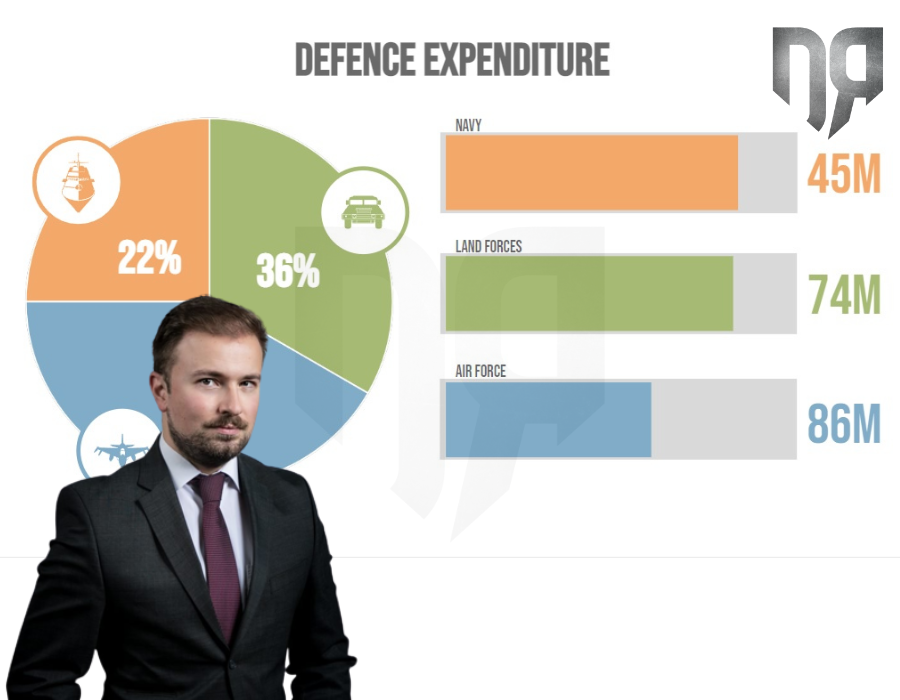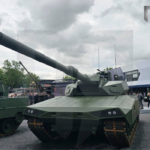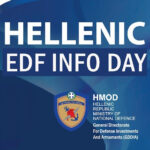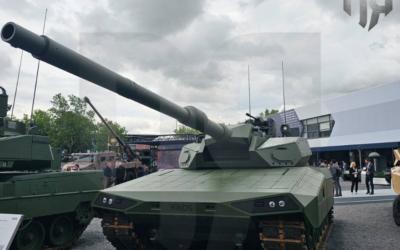It has only been a few months since Croatia started receiving the first of the Rafale fighter jets it ordered from France.

Ioannis Sidiropoulos*
The last few years have seen impressive growth in the domestic defence-related industry in Cyprus.
Today, in our country, there is a dynamic, innovative, and rapidly growing defence sector, which has developed high-tech infrastructure, specialized know-how, and international collaborations. Innovative Cypriot technology companies are active in the defence industry, designing, producing, and exporting dual-use products, i.e., products that can be used for both military and peaceful purposes.
Lately, Cypriot companies have achieved significant success with their participation in design and co-production programs, in major European projects. With the support of the Ministry of Defense, they have already secured their participation in 17 contracts for the development of new European defence systems with a total value of €172.5 million (Kounoudis, 2023).
This reality entails certain business relations; this industry cannot exist as an island. Participation in international projects means that there is a need for imports of dual-use/military software and hardware, while such production will not only satisfy domestic needs but will also have an export orientation.
Also read: Podcast S3E3 | The European Perspective for the emerging Cypriot Defence Industry
Dual-use/defence-related material particularities
This article will not address Cyprus Law 84(I)/2021 on the security rules concerning classified information, documents, and material as well as other related matter (referring to EU Decision 2013/488 on the security rules protecting EU classified information), as this is the area of a public defence policy and state security.
The basis of legislation controlling the export of dual-use items is EU Regulation 821/2021 (the “Regulation”), which governs the EU’s export control regime, repealing EU Regulation 428/2009 for the control of exports, transfer, brokering, and transit of dual-use items. To implement the repealed EU Dual-Use Regulation, the Minister of Energy, Commerce, Industry and Tourism of Cyprus issued the Ministerial Order 312/2009 (the “Order”).
The current Regulation includes Annex VI matching the 428/2009 provisions to the current ones, providing legal certainty on the transition. The repealed Regulation remains applicable to export authorization applications submitted before September 9, 2021.
EU’s export controls take into account the EU and its Member States’ international obligations, including the UN Security Council Resolution 1540, the Nuclear Non-Proliferation Treaty, the Chemical Weapons Convention, and the Biological Weapons Convention. The Regulation contributes to the goals of the European Atomic Energy Community (Euratom) concerning trade in nuclear material and the peaceful uses of nuclear energy.
According to the Regulation, “Export” means: (a) an export procedure within the meaning of Article 269 of the Union Customs Code (the “Code”), (b) a re-export within the meaning of Article 270 of the Code, (c) an outward processing procedure within the meaning of Article 259 of the Code; or Decision No 1104/2011 EU on the rules for access to the public regulated service provided by the global navigation satellite system established under the Galileo program (OJ L 287, 4.11.2011, p. 1), (d) transmission of software or technology by electronic media, to a destination outside the customs territory of the Union.
This new EU legislation seems to enhance the EU’s capacity to address human rights-related concerns and control trade in sensitive new and emerging technologies. It includes common export control rules, i.e., a set of assessment criteria and common types of authorizations (individual, global, and general authorizations), an EU list of dual-use items, and provisions for end-use controls on non-listed items which could be used e.g., in connection with a Weapons of Mass Destruction (WMD) program.
Moreover, there is provision for controls on brokering and technical assistance relating to dual-use items and their transit through the EU, specific control measures and compliance to be introduced by exporters, such as record-keeping and registers, and provisions setting up a network of competent authorities supporting the exchange of information and the consistent implementation and enforcement of controls throughout the EU (arts 27, 28).
Annex I to the regulation, based on internationally agreed controls, lists the dual-use items that require export authorization. The list of dual-use items is amended periodically. These include special materials and related equipment, materials processing, electronics, computers, telecommunications and information security, sensors and lasers, navigation and avionics, marine systems, aerospace, and propulsion systems.
Other dual-use items, including any associated brokering services or technical assistance, need export authorization if they are intended, entirely or in part, for chemical, biological, or nuclear weapons, military use in countries subject to an arms embargo, and components of military items already exported from an EU Member State without the necessary authorization (art 4).
Furthermore, individual Member States may impose provisions that items must be subject to export authorization by that Member State, where there are reasons to believe there is any connection with “internal repression and/or the commission of serious violations of international human rights and international humanitarian law”. In such a case, a relevant report by the Exporter and further notification to the EU institutions, are necessary (art. 5). The new Regulation also provides that some of the export authorizations shall be subject to an end-use statement, unless exempted by the relevant authority.
Dual-use items may be traded freely within the EU, except for some particularly sensitive ones, whose transfer within the EU remains subject to prior authorization (Annex IV of the Regulation).
Also read: SIPRI | Increase in arms imports to Europe – US dominance of global arms trade
The existing legislative foundation for enforcing import and export controls in Cyprus is the Customs Code Law (L. 94(I)/2004). It includes provisions in relation to prohibitions and restrictions on the import and export of sensitive goods.
Furthermore, the Law on the Import and Export of Controlled Items and the Conduct of Controlled Activities (L. 1(I)/2011) aligns Cypriot export control regulations with international treaties signed by our country and with important multilateral export control regimes such as the Australia Group, the Wassenaar Arrangement, the Nuclear Suppliers Group, and the Missile Technology Control Regime. The regulated items under the 1(I)2011 law include (but are not limited to) military equipment and dual-use products. The competent authority responsible for such export authorizations is the Minister of Energy, Commerce, Industry, and Tourism.
In exercising its export licensing capacity, the competent authority takes into account factors including Cyprus’ commitments under international export control regimes, safety conventions, treaties, and institutional rules, the nature of the parties involved, the national security, and considerations about the intended end use of the dual-use products. The Order (para 7) provided that the Minister may issue an export license (subject to categorizations) if the provisions of the relevant EU Regulations are satisfied (hence, an explicit reference to the respective EU requirements). Paragraph 10 referred to ‘catch-all’ controls (i.e., for items not listed in Annex I of the Regulation).
Brokering controls of dual-use goods are covered by the Regulation and national rules, as well. ‘Brokering services’ is the negotiation or arrangement of transactions for the purchase, sale, or supply of dual-use items from a third country to any other third country; or the selling or buying of dual-use items located in third countries for their transfer to another third. According to the Regulation, the sole provision of ancillary services is excluded from this definition. Ancillary services are transportation, financial services, insurance or reinsurance, or general advertising or promotion.
Export, brokering controls, and technical assistance in relation to military equipment, are governed by Cyprus Regulations no. 522/2011 (in the context of applying L. 1(I)/2011) according to which, the provision of such services related to military equipment also requires a license.
Inward Business
The aspect of Foreign Direct Investments
EU Regulation 2019/452 provides a framework for screening foreign direct investments (FDI) into the Union. This framework controls business/transactions that could put public order at risk, allowing for a clear overview of foreign investments enhanced through the cross-border cooperation of all Member States. It is at the discretion of each Member State to adopt an FDI screening mechanism, while the role of the EU Commission in the process is solely a coordinative one. Cyprus has not adopted the framework and has reported no initiative underway in doing so.
This doesn’t mean that domestic cases will be left unmonitored; a Cooperation Mechanism has been established to secure a certain level of control over FDI that risk public order and take place in Member States, which have not yet incorporated screening mechanisms in their national systems. Through the Commission’s duly justified opinions (after securing at least one-third of the Member States) and/or the Member States’ comments on any FDI in the EU, the Commission can detect those putting security or public order at risk.
Hypothetically, an FDI in Cyprus, lacking national screening, could be subject to an opinion of the Commission or comments of other Member States that indicate how this transaction might harm public order. Cyprus authorities would then have to consider those comments and decide whether to use domestic laws to examine the transaction and its effects.
Merger Control
Parties should also be vigilant about whether there is a notification requirement under the competition/merger control rules. To ascertain whether a concentration is subject to notification with the Competition Protection Commission (CPC), for clearance, it must fulfill jurisdictional thresholds under the Merger Control Law (The Control Of Concentrations Between Undertakings Law,- 83(I)/2014).
Concentrations between undertakings that result in a change of control on a lasting basis are defined under the Merger Control Law as comprising any of the following: a merger of two previously independent undertakings or parts of them, or acquisitions, by one or more persons that already control at least one undertaking, or by one or more undertakings (directly or indirectly), whether by the purchase of securities or assets, by agreement or otherwise, of control of one or more other undertakings, or Joint ventures performing all functions of an autonomous economic entity on a lasting basis.
A concentration qualifies as a major important one and is notifiable to CPC when:(a) (i) the aggregate turnover achieved of each of at least two of the participating undertakings is more than three million, five hundred thousand (3.500.000) euros, and (ii) at least two of the participating undertakings achieve turnover within the Republic (of Cyprus), and (iii) at least 3.500.000 euros out of the aggregate turnover of all the participating undertakings is achieved within the Republic, or (b) it is declared as such by Order of the Minister under section 5 of that Law.
Also read: BATTLEFIELD ReDEFiNED 2023 | European Defence Initiatives and the Cyprus Defence Industry
Public Procurement Processes
It is often the case that purchases of military-related material in the Republic of Cyprus are subject to a public procurement process, in the general legislative framework outlined by EU Directives for Public Procurement (2014/24) and on the Coordination of procedures for the award of certain works contracts, supply contracts, and service contracts by contracting authorities or entities in the fields of defense and security (2009/81).
In the case of such processes, at a Cyprus national level, tenders are governed by the “Regulation of Procedures for concluding public procurements and related issues Law of 2016” – Public Procurement Law (No.73(I)/2016). The contracting authorities shall evaluate the tenders submitted by the tenderers based on the award criteria set out in the invitation / descriptive document and select the most economically advantageous tender.
The tenderer considered to have submitted such tender may be invited by the Contracting Authority to provide clarifications or confirm commitments. Under section 49(5), certain information relating to the conclusion of the contract or framework agreement may not be disclosed when such disclosure could affect law enforcement, public interest / legitimate commercial interests of public or private economic operators, or fair competition.
Standardization
Standardization means the effective and organized use of systems, platforms, and protocols and attributes great importance to the availability of skilled, trained, and knowledgeable professionals (i.e., procurement officers, military personnel, financiers, lawyers, etc.).
The case for uniformity among various jurisdictions, in terms of arms/defence deals, has long been addressed. In Europe, there has been lately an intensification of the relevant efforts, following, to some extent, the systemization paradigm of the US. Basic guidance points are the above-mentioned 2009/81 Directive (in particular art. 18), the EU Industrial Strategy, and the EU Standardization Strategy COM 22 set of policies.
Also read: EDA | Pilot training course on European Defence Standardisation
Concerning the Directive, without prejudice to either compulsory national technical rules (including those related to product safety) or the technical requirements to be met by the Member State under international standardization agreements to guarantee the interoperability required by those agreements and provided they are compatible with Community law, technical specifications shall be drawn up, in order of preference, (among others) to national civil standards transposing EU standards, European technical approvals, common civil technical specifications, national civil standards transposing international standards, civil technical specifications stemming from industry, et al.
Best practices include the interplay between the defence industry, SDO – Quality Organizations, Industry, and SMEs. A particularly important aspect is the utilization of civil standards, which can have a “cost-efficiency payoff” for the defence sector and facilitate the effective interconnection of that sector with the rest of the technological ecosystem of small countries, such as Cyprus. Exporters/importers should consider the general directions provided by the above set of policies and rules.
According to N. Myriounis, HN (ret.), an expert in EU and NATO defence standardization matters, common standards strengthen interoperability as the EU is facing multiple geopolitical challenges and risks, entailing (among other necessities) the need for intensification of armaments. This is particularly relevant for the smaller countries struggling to achieve force-building amidst rising tensions and skyrocketing armament prices. And of course, also for the materialization of a common Defense policy in the EU.
Conclusion
The successes of the Cyprus defence industry now put Cyprus seriously on the map of the European defence industry. With the intensification of its output, and the progress in developing the logistical infrastructure, know-how, and capabilities to participate as a co-producer in the European supply chain of operational defence systems, the respective legal framework will become increasingly relevant.
Also read: BATTLEFIELD ReDEFiNED 2023 | The emerging Cypriot Defence Industry – EU Funding Opportunities
*Lawyer, LL.M Commercial Law (LSE), LL.M International Trade and Investment (UvA)
**The views and/or comments expressed in the articles belong to each author and may not constitute an opinion and/or position and/or be adopted as is by the company and/or the site administrators. More in the terms of use of the website.
***Opinions expressed within this article are solely the author’s and do not constitute legal advice.
READ MORE
The role of SERIOUS GAMES in the development of skills on Defense Standards
In an increasingly complex world, one vital factor for any successful organization is continuous capability building.
Strategy for Building Up Interoperable Defence Capabilities
Based on the current and emerging security threats and challenges in the geostrategic landscape, there is a…
EUROSATORY 2024 | Missile Artillery Solutions from MBDA
With such a large number of interested attendees at MBDA’s pavilion at the Eurosatory 2024 Defence exhibition, the stand reminded of an…
KNDS | Showcases full range of LEOPARD battle tanks at EUROSATORY
KNDS continues to expand its technological advantage in the field of main battle tank development, as we have witnessed at the Defence and…
THEON SENSORS | Distinguishing appearance at EUROSATORY 2024 with new range of products
THEON SENSORS attended the International Defence and Security Exhibition EUROSATORY 2024 as an ambassador of Greek innovation…
Ministry of Defence | Organization of Hellenic EDF Info Day
A Conference entitled “EDF Info Day” is organized in the Amphitheater of the National Gallery on Tuesday, July 9 from 09:00 to 17:00.
ALTUS LSA | Participates in EUROSATORY 2024 with KERVEROS in the foreground
The participation of ALTUS LSA in EUROSATORY 2024 is among the Greek participations of operational significance.
Freddy Beleris | Ιn jail until October
The elected mayor of Heimarra and Member of the European Parliament of New Democracy will remain in prison until October…





















